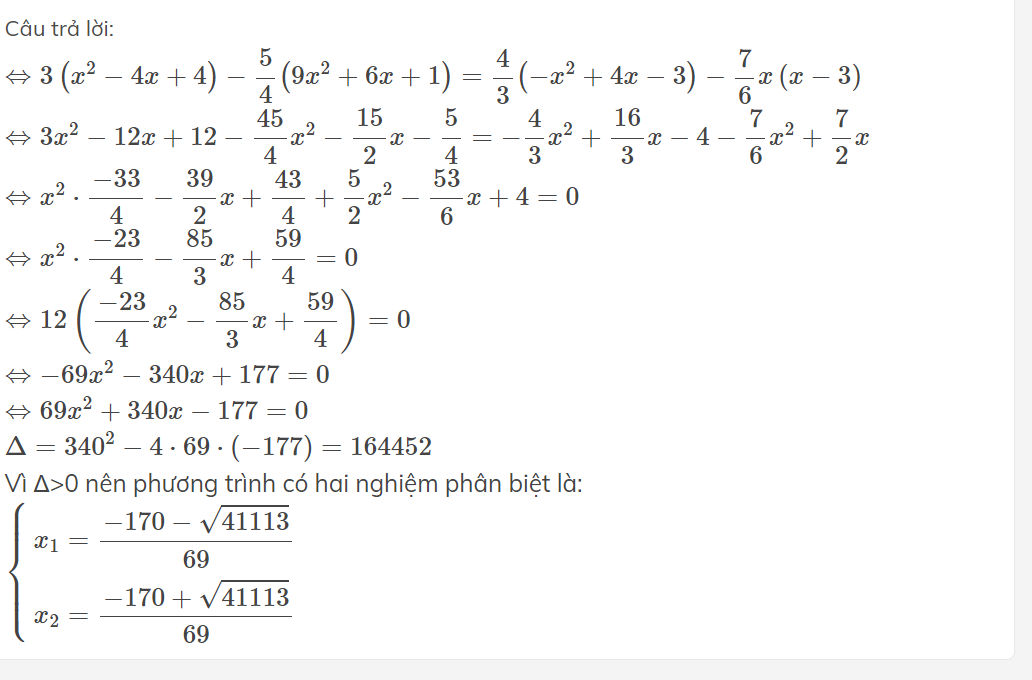Hãy nhập câu hỏi của bạn vào đây, nếu là tài khoản VIP, bạn sẽ được ưu tiên trả lời.

\(\Leftrightarrow\dfrac{1}{2}\left(x^2-4x+4\right)-\dfrac{13}{3}\left(x^2+6x+9\right)=\dfrac{1}{4}\left(x^2-3x+2\right)-2\left(9x^2+3x-2\right)\)
\(\Leftrightarrow x^2\cdot\dfrac{1}{2}-2x+2-\dfrac{13}{3}x^2-26x-39=\dfrac{1}{4}x^2-\dfrac{3}{4}x+\dfrac{1}{2}-18x^2-6x+4\)
\(\Leftrightarrow x^2\cdot\dfrac{167}{12}-\dfrac{85}{4}x-\dfrac{83}{2}=0\)
\(\Leftrightarrow167x^2-255x-498=0\)
\(\text{Δ}=\left(-255\right)^2-4\cdot167\cdot\left(-498\right)=397689\)
Vì Δ>0 nên phương trình có 2 nghiệm phân biệt là:
\(\left\{{}\begin{matrix}x_1=\dfrac{255-\sqrt{397689}}{334}\\x_2=\dfrac{255+\sqrt{397689}}{334}\end{matrix}\right.\)

\(\frac{\left(2-3x\right)^2}{3}-\frac{\left(1+2x\right)^2}{2}=\frac{3}{4}-2\left(x-1\right)\left(x+2\right)+x\left(1+x\right)\)
\(\frac{2^2-12x-3x^2}{3}-\frac{1^2+4x+2x^2}{2}=\frac{3}{4}-\left(x^2+x-2\right)+3x\)
\(\frac{2.\left(4-12x-3x^2\right)}{6}-\frac{3.\left(1+4x+2x^2\right)}{6}=\frac{11}{4}-x^2+2x\)
\(\frac{8-24x-6x^2}{6}-\frac{3+12x+2x^2}{6}=\frac{11}{4}-x^2+2x\)
\(\frac{8-24x-6x^2-3-12x-2x^2}{6}=\frac{11}{4}-x^2+2x\)
\(\frac{5-36x-8x^2}{6}=\frac{11}{4}-x^2+2x\)
Chỗ đây thì mk chịu

Bài 1:
a) \(\frac{1}{5}x^4y^3-3x^4y^3\)
= \(\left(\frac{1}{5}-3\right)x^4y^3\)
= \(-\frac{14}{5}x^4y^3.\)
b) \(5x^2y^5-\frac{1}{4}x^2y^5\)
= \(\left(5-\frac{1}{4}\right)x^2y^5\)
= \(\frac{19}{4}x^2y^5.\)
Mình chỉ làm 2 câu thôi nhé, bạn đăng nhiều quá.
Chúc bạn học tốt!

\(\Leftrightarrow\dfrac{1}{3}\left(4x^2-4x+1\right)-\dfrac{1}{2}\left(9x^2+6x+1\right)=\dfrac{1}{3}\left(2x-3x^2-2+3x\right)\)
\(\Leftrightarrow\dfrac{4}{3}x^2-\dfrac{4}{3}x+\dfrac{4}{3}-\dfrac{9}{2}x^2-3x-\dfrac{1}{2}=\dfrac{1}{3}\left(-3x^2+5x-2\right)\)
\(\Leftrightarrow x^2\cdot\dfrac{-19}{6}-\dfrac{13}{3}x+\dfrac{5}{6}+x^2-\dfrac{5}{3}x+\dfrac{2}{3}=0\)
\(\Leftrightarrow x^2\cdot\dfrac{-13}{6}-6x+\dfrac{3}{2}=0\)
\(\text{Δ}=\left(-6\right)^2-4\cdot\left(-\dfrac{13}{6}\right)\cdot\dfrac{3}{2}=49\)
Vì Δ>0 nên phương trình có hai nghiệm phân biệt là:
\(\left\{{}\begin{matrix}x_1=\dfrac{6-7}{2\cdot\dfrac{-13}{6}}=\dfrac{3}{13}\\x_2=\dfrac{6+7}{2\cdot\dfrac{-13}{6}}=-3\end{matrix}\right.\)

\(\Leftrightarrow3\left(x^2-4x+4\right)-\dfrac{5}{4}\left(9x^2+6x+1\right)=\dfrac{4}{3}\left(-x^2+4x-3\right)-\dfrac{7}{6}x\left(x-3\right)\)
\(\Leftrightarrow3x^2-12x+12-\dfrac{45}{4}x^2-\dfrac{15}{2}x-\dfrac{5}{4}=-\dfrac{4}{3}x^2+\dfrac{16}{3}x-4-\dfrac{7}{6}x^2+\dfrac{7}{2}x\)
\(\Leftrightarrow x^2\cdot\dfrac{-33}{4}-\dfrac{39}{2}x+\dfrac{43}{4}+\dfrac{5}{2}x^2-\dfrac{53}{6}x+4=0\)
\(\Leftrightarrow x^2\cdot\dfrac{-23}{4}-\dfrac{85}{3}x+\dfrac{59}{4}=0\)
\(\Leftrightarrow12\left(\dfrac{-23}{4}x^2-\dfrac{85}{3}x+\dfrac{59}{4}\right)=0\)
\(\Leftrightarrow-69x^2-340x+177=0\)
\(\Leftrightarrow69x^2+340x-177=0\)
\(\text{Δ}=340^2-4\cdot69\cdot\left(-177\right)=164452\)
Vì Δ>0 nên phương trình có hai nghiệm phân biệt là:
\(\left\{{}\begin{matrix}x_1=\dfrac{-170-\sqrt{41113}}{69}\\x_2=\dfrac{-170+\sqrt{41113}}{69}\end{matrix}\right.\)